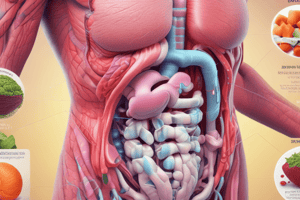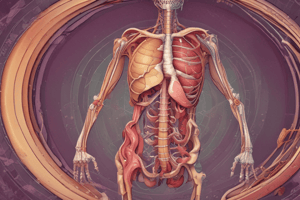Podcast
Questions and Answers
What is the approximate percentage of patients with symptomatic disease that develop complicated diverticular disease?
What is the approximate percentage of patients with symptomatic disease that develop complicated diverticular disease?
In which areas of the colon does diverticulosis primarily occur?
In which areas of the colon does diverticulosis primarily occur?
What is a potential complication of diverticulitis?
What is a potential complication of diverticulitis?
In which patients is surgery often recommended for recurrent episodes of symptomatic uncomplicated diverticular disease?
In which patients is surgery often recommended for recurrent episodes of symptomatic uncomplicated diverticular disease?
Signup and view all the answers
What is a consequence of surgery for complicated diverticular disease in elderly and frail individuals?
What is a consequence of surgery for complicated diverticular disease in elderly and frail individuals?
Signup and view all the answers
What is the current understanding of the etiology and pathogenesis of diverticular disease?
What is the current understanding of the etiology and pathogenesis of diverticular disease?
Signup and view all the answers
What is the primary factor that contributes to the development of diverticulosis?
What is the primary factor that contributes to the development of diverticulosis?
Signup and view all the answers
What is the typical age range for uncomplicated diverticular disease in Western society?
What is the typical age range for uncomplicated diverticular disease in Western society?
Signup and view all the answers
What is the term for the presence of colonic nonneoplastic out-pockets of the mucosa produced by herniation through the muscular wall of the colon?
What is the term for the presence of colonic nonneoplastic out-pockets of the mucosa produced by herniation through the muscular wall of the colon?
Signup and view all the answers
What is the recommended strategy for managing diverticulosis?
What is the recommended strategy for managing diverticulosis?
Signup and view all the answers
What is the primary goal of using rifaximin in the management of diverticulosis?
What is the primary goal of using rifaximin in the management of diverticulosis?
Signup and view all the answers
What is the recommended duration of rifaximin administration for the prevention of diverticular flare?
What is the recommended duration of rifaximin administration for the prevention of diverticular flare?
Signup and view all the answers
What is the mechanism of action of metronidazole in the treatment of diverticulosis?
What is the mechanism of action of metronidazole in the treatment of diverticulosis?
Signup and view all the answers
What is the relationship between industrialization and the prevalence of diverticulosis?
What is the relationship between industrialization and the prevalence of diverticulosis?
Signup and view all the answers
What is the term for the inflammation of diverticula?
What is the term for the inflammation of diverticula?
Signup and view all the answers
What is the primary benefit of using tailored probiotic mixture formulations in the treatment of diverticulosis?
What is the primary benefit of using tailored probiotic mixture formulations in the treatment of diverticulosis?
Signup and view all the answers
What specific preparation is suggested by the Board of the European Society of Gastrointestinal Endoscopy in its 2020 updated clinical guideline?
What specific preparation is suggested by the Board of the European Society of Gastrointestinal Endoscopy in its 2020 updated clinical guideline?
Signup and view all the answers
What is crucial after the confirmation of the diagnose of asymptomatic uncomplicated diverticular disease (AUD)?
What is crucial after the confirmation of the diagnose of asymptomatic uncomplicated diverticular disease (AUD)?
Signup and view all the answers
What is the recommended daily intake of fibre in the diet for patients with asymptomatic uncomplicated diverticular disease (AUD)?
What is the recommended daily intake of fibre in the diet for patients with asymptomatic uncomplicated diverticular disease (AUD)?
Signup and view all the answers
What is the effect of autolyzed brewers’ yeast on symptoms of asymptomatic uncomplicated diverticular disease (AUD)?
What is the effect of autolyzed brewers’ yeast on symptoms of asymptomatic uncomplicated diverticular disease (AUD)?
Signup and view all the answers
What is the effect of a diet with a low content of chlorine on symptoms of asymptomatic uncomplicated diverticular disease (AUD)?
What is the effect of a diet with a low content of chlorine on symptoms of asymptomatic uncomplicated diverticular disease (AUD)?
Signup and view all the answers
What is the role of Western lifestyle changes and higher BMI populations originating from industrialized countries in diverticular disease?
What is the role of Western lifestyle changes and higher BMI populations originating from industrialized countries in diverticular disease?
Signup and view all the answers
What is the current understanding of the pathogenesis of symptomatic uncomplicated diverticular disease (SUDD)?
What is the current understanding of the pathogenesis of symptomatic uncomplicated diverticular disease (SUDD)?
Signup and view all the answers
What is the significance of phenotypic polyposis (EPICOLON) in diverticular disease?
What is the significance of phenotypic polyposis (EPICOLON) in diverticular disease?
Signup and view all the answers
What is the role of genome-wide association studies in diverticular disease research?
What is the role of genome-wide association studies in diverticular disease research?
Signup and view all the answers
What is the suggestion for patients not adhering to dietary interventions to attenuate symptom occurrence?
What is the suggestion for patients not adhering to dietary interventions to attenuate symptom occurrence?
Signup and view all the answers
What is the potential advantage of using novel wound care drugs in diverticular symptom control?
What is the potential advantage of using novel wound care drugs in diverticular symptom control?
Signup and view all the answers
What is the role of the pharmacist in diverticular disease care?
What is the role of the pharmacist in diverticular disease care?
Signup and view all the answers
What is the benefit of mesalazine in the prevention of AUD burden?
What is the benefit of mesalazine in the prevention of AUD burden?
Signup and view all the answers
What is the potential use of anti-5-hydroxy-tryptamine agents in patients with diverticular disease?
What is the potential use of anti-5-hydroxy-tryptamine agents in patients with diverticular disease?
Signup and view all the answers
Why should antimotility agents be avoided in patients with diverticular disease?
Why should antimotility agents be avoided in patients with diverticular disease?
Signup and view all the answers
What is the potential benefit of anti-depressants in patients with long-term AUD?
What is the potential benefit of anti-depressants in patients with long-term AUD?
Signup and view all the answers
What is the role of pharmaceutical counseling in diverticular disease care?
What is the role of pharmaceutical counseling in diverticular disease care?
Signup and view all the answers
What is the importance of the pharmacist's ready access to medical charts of patients?
What is the importance of the pharmacist's ready access to medical charts of patients?
Signup and view all the answers
What is the goal of the pharmacist's collaboration with the patient in diverticular disease care?
What is the goal of the pharmacist's collaboration with the patient in diverticular disease care?
Signup and view all the answers
What is the benefit of ensuring adequate fiber consumption in patients with diverticulosis?
What is the benefit of ensuring adequate fiber consumption in patients with diverticulosis?
Signup and view all the answers
Study Notes
Diverticular Disease Overview
- Complicated diverticular disease occurs in 10-25% of patients with symptomatic disease, leading to increased morbidity and mortality in elderly and frail individuals.
- Uncomplicated diverticulosis is extremely common in Western society, particularly in those over 80 years old.
- The disease is more prevalent in developed countries and is associated with a Western diet.
Pathogenesis of Diverticular Disease
- Diverticulosis primarily occurs in areas of the colon with high intraluminal pressures, such as the sigmoid and descending colon.
- Increased pressure within the colon, coupled with high fiber content in the diet, generates higher pressures around areas of tight colon and weak zones of the colonic wall, leading to diverticulosis development.
Pharmacological Management Options
- Tailored probiotic mixture formulations with oral antibiotics may be useful in treating diverticulosis recurrences.
- Rifaximin reduces the recurrence of diverticular flares by 35% and is recommended for the first 12-24 months in conjunction with fiber.
- Metronidazole is the oldest qualifying and first-line anti-anaerobic therapy for diverticulosis.
Role of the Pharmacist in Diverticular Disease Care
- Pharmacists can play a more dynamic role in proactively engaging with diverticular disease patients, particularly in individuals with chronic constipation.
- Community Clinical Pharmacy Collaborations can contribute to improved diagnostic processes between GPs and pharmacists.
- Pharmacists can create programs to motivate older adults to follow up, such as evaluating colonic motility.
Patient Education and Counseling
- Patient education focused on the chronic benign characteristics of the disease and the lack of malignancy risk is crucial.
- A high-fiber diet (at least 25 g per day) with a 70% soluble/30% insoluble fiber profile is recommended.
- Increasing the intake of autolyzed brewers’ yeast and avoiding a fatty and low content of red meat can decrease symptoms.
Emerging Trends and Future Directions
- Recent years have seen a change in awareness of IBS and diverticular disease, emphasizing a thorough assessment and excluding various natural or organic pathology causes.
- The pathogenesis of symptomatic uncomplicated diverticular disease is multifactorial, with environmental and genetic interplay factors.
- Emerging data and research support the belief that therapy targeted toward the genes of the gut is anticipated in the near future.
Studying That Suits You
Use AI to generate personalized quizzes and flashcards to suit your learning preferences.
Description
A comprehensive guide to managing diverticular disease, including treatment options for complicated and recurrent cases, with a focus on elderly and frail individuals.




